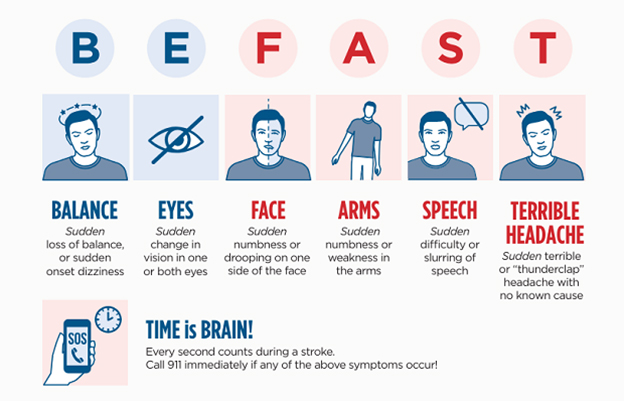Stroke Symptoms
A stroke occurs when blood flow to the brain is interrupted, either by a blood clot (ischemic stroke) or a burst blood vessel (hemorrhagic stroke). Quick recognition of stroke symptoms and immediate medical attention are critical, as brain cells begin dying within minutes of blood flow disruption. Understanding and identifying stroke and cerebrovascular disease symptoms can be the difference between life-altering disability and recovery.
The sudden onset of stroke symptoms can be frightening and overwhelming. RWJBarnbas Health emergency stroke teams are available 24/7 across our network of Primary and Comprehensive Stroke Centers, ready to provide immediate, expert care when every second counts. Our specialized neurologists, emergency medicine physicians, and stroke care experts use advanced diagnostic tools and proven treatment protocols to deliver the fastest possible care when you need it most. We are a trusted partner in stroke care, providing immediate, lifesaving intervention when stroke symptoms appear.
What Are the Symptoms of a Stroke?
A stroke is a life-threatening emergency where blood flow to the brain is interrupted, causing brain cells to die within minutes. Immediate medical attention can mean the difference between recovery and permanent disability or death.

B.E. F.A.S.T. Warning Signs
Call 911 immediately if you notice any of these symptoms:
B - Balance
- Sudden loss of balance or coordination
- Unexpected dizziness
- Trouble walking
- Unexplained falls
E - Eyes
- Sudden vision problems in one or both eyes
- Blurred or double vision
- Complete vision loss
- Difficulty seeing to one side
F - Face
- Facial drooping
- Uneven smile
- Numbness on one side
- Difficulty controlling facial muscles
A - Arm
- Weakness in arm or leg
- Numbness on one side
- Inability to raise both arms evenly
- Dropping objects unexpectedly
S - Speech
- Slurred speech
- Difficulty finding words
- Unable to repeat simple phrases
- Speaking nonsensically
T - Terrible Headache and Time
- Sudden severe headache
- "Thunderclap" headache
- Worst headache of life
- Time is critical - call 911 immediately
Additional warning signs of a stroke include:
- Confusion or difficulty understanding
- Loss of consciousness
- Sudden behavioral changes
- Difficulty swallowing
- Unexplained falls
- Sudden severe neck pain
Emergency Response for Stroke
If you notice any stroke symptoms, call 911 immediately.
Don't wait to see if symptoms improve or attempt to drive yourself to the hospital. Time is critical during a stroke, and every minute counts in preventing long-term damage. Make note of when symptoms first appeared, as this information is crucial for treatment decisions.
When speaking with emergency services, remain on the line and carefully follow all dispatcher instructions. While waiting for help to arrive, gather a list of current medications and unlock your door to ensure quick access for emergency medical personnel. Important: Do not eat or drink anything, as this could complicate emergency treatment procedures.
Unique Stroke Symptoms in Women
Women may experience these additional symptoms of an oncoming stroke:
- Sudden hiccups
- Nausea or vomiting
- General weakness
- Chest pain
- Shortness of breath
- Heart palpitations
- Agitation
- Seizures
Types of Stroke Symptoms
Different types of strokes present with distinct symptoms that help determine the most appropriate treatment approach.
An ischemic stroke typically causes symptoms that affect one side of the body. These symptoms develop suddenly and may gradually worsen over minutes to hours as blood flow to the brain becomes restricted.
Hemorrhagic strokes often begin with a severe headache and may be accompanied by vomiting. These strokes can lead to decreased consciousness and typically develop more rapidly than other types of stroke due to bleeding in the brain.
A transient ischemic attack (TIA), sometimes called a "mini-stroke," produces temporary stroke symptoms that usually last less than an hour. While symptoms may resolve quickly, a TIA should still be treated as a medical emergency as it often serves as a warning sign for future, more severe strokes.
A stroke may be the first sign of cerebrovascular disease.
Risk Factors That Make Symptoms More Likely
Several medical conditions and lifestyle factors can increase your likelihood of experiencing a stroke. Key risk factors include:
- High blood pressure
- Diabetes
- Smoking
- Age over 55
- Family history
- Previous stroke or TIA
- Heart disease
While some risk factors like age and family history cannot be changed, working with your health care provider to manage other risk factors through lifestyle modifications and appropriate medical care can significantly reduce your stroke risk.
Talk to your doctor about developing a personalized stroke prevention plan.
Immediate Care for Stroke Symptoms
“Time is brain” when stroke occurs. The longer you wait to treat it, the more likely there will be permanent damage to brain cells. Knowing the symptoms of a stroke coming on and acting quickly can be the difference between recovery and disability. Don't wait to see if symptoms improve – immediate medical attention is crucial for the best possible outcomes.
At RWJBarnabas Health, our emergency stroke teams are ready 24/7 to provide rapid response care. Our specialized neurologists and emergency medicine physicians use advanced diagnostic tools and proven protocols to deliver immediate, lifesaving treatment when every second counts.
Remember: Acting fast is critical. If you suspect a stroke, call 911 immediately.
Talk to a Doctor
To learn more about stroke and your personal risk, talk to your primary care physician or request an appointment with a neurologist using the button below.
